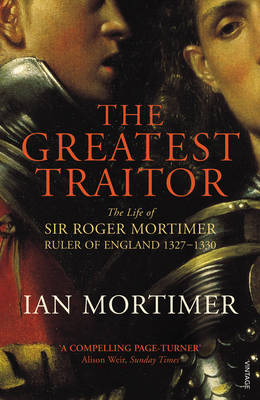Ian Mortimer |
The Greatest Traitor
Reviews
'Mortimer's book is a cogent account of Roger's ascendancy during the last years of Edward I's kingship and Edward II's wretchedly poor reign. Mortimer soberly measures his sources one against the other and draws logical conclusions, never claiming any subjective insight into character or motive without evidence to support it. This scholarly exactitude is attained without fustiness; Mortimer's is a colourful evocation of the bloody carnival tempered by a tenuous chivalric code that was medieval Britain...Its intellectual rigour warrants our attention.' (The Times).
'The original intensity of the events is done justice by the author, who can be excused for allowing excitement occasionally to get the better of his fluid prose: readers might be forgiven for thinking him an eye-witness to the Battle of Bannockburn. But his book is a deeply competent and cogent portrait. Mortimer has a keen eye for documents, and his attentive cataloguing of the sources for Roger's itinerary in the appendices will long remain the standard authority. By confining much of the historiographical debate to his endnotes he retains an impressive pace without sacrificing detail or reliability.' (Times Literary Supplement).
'A superb study of the man who was effective ruler of England from 1327 to 1330. It is not easy to write the life of a medieval magnate. The sources are few, and it is hard to bring them to life. Too often, an attempted biography degenerates into a 'life and times' treatment, in which the subject recedes into the background. But not so here: Roger is kept firmly to the fore.' (Professor Nigel Saul, History Today).
'Mortimer's book roars, races and sings... [He] takes the reader there, whether to feast, tournament or council chamber, with a sense of passion and drama and an unrelenting pace. Unusually for a man whose career has been spent in record offices, he is never better than when on the field of battle. At Bannockburn and Boroughbridge we are there too, floundering in the rain, watching the wood-and-daub villages pulled apart to make walkways across the mud. And at the the end of a march, numb with weariness and cold, we too must stuff our mouths with old bread made damp and salty by the sweat of our steeds.' (Ann Wroe, Daily Telegraph).
'An exemplary account that demonstrates a deep engagement with the sources and a refreshing directness of narrative style.' (Professor Mark Ormrod, BBC History Magazine).
'[The author] clearly delights in conjuring up scenes of medieval Britain, Ireland and continental Europe as a suitably dramatic backdrop to a marvellous tale of adventure and intrigue... One of the truly great and memorable stories in medieval history.' (The Good Book Guide).
'Ian Mortimer has served (his subject) well. With a highly accomplished mastery of the archives, and a judicious use of conjecture, he has produced a vivid portrait of the man and of his age.' (John Adamason, The Sunday Telegraph).
'He succeeds in bringing Mortimer to life as never before - I have rarely read such good accounts of the Despenser War and Roger's escape from the Tower.' (Alison Weir, The Sunday Times).
'Ian Mortimer's exacting standards of scholarship mean that his book will undoubtedly remain the standard authority on its subject.' (Mark Bostridge, The Independent on Sunday).
'Ian Mortimer's meticulously crafted text etches a sense of realism into the proceedings. In short, as with all great historical authors, every page just seems to ring with the truth.' (Manchester Evening News).
- Synopsis
- Introduction
- About writing the book
- Reviews
- UK publisher's website
- Buy ebook from the USA publisher's website
- Original UK hardback cover (Jonathan Cape)
- Original UK paperbackback cover (Pimlico)
- Original USA hardback cover (Thomas Dunne)
